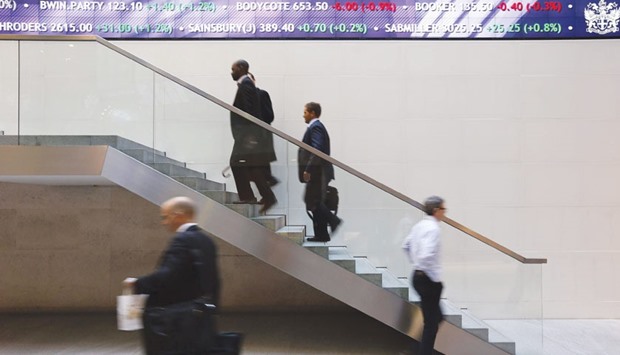European stock markets tumbled yesterday as BP’s vast annual earnings loss rattled an energy sector already battered by sliding oil prices.
London equities fell 2.3%, with British energy giant BP sinking nearly 9% after posting the company’s biggest loss in at least 20 years on the oil-price collapse.
BP suffered a loss after tax of $6.48bn (€5.97bn) last year, compared with a net profit of $3.78bn in 2014, and announced another 3,000 job cuts.
The news sent BP shares tanking 8.7% to 335.1 pence. Anglo-Dutch rival Royal Dutch Shell saw its ‘B’ share price shed 4.1% to 1,433.5 pence.
In Paris, French oil titan Total lost 4.5% to €38.21.
Across Europe, London’s FTSE 100 plunged 2.3% at 5,922.01 points; Frankfurt’s DAX 30 by 1.8% at 9,581.04, while Paris’ CAC 40 was Down 2.5% at 4,283.99. The EURO STOXX 50 fell 2.5% at 2,944.85.
Other European indices were also hammered as oil prices resumed their downward slide. Moscow’s RTS index slumped 4%, while both Italy and Madrid lost around 3%.
Meanwhile, US markets dropped after ExxonMobil reported a 58% drop in fourth-quarter earnings to $2.8bn, with the Dow down 1.2% nearing midday.
ExxonMobil shares dropped 2.6% to $74.29.
“We are back to the same old story today with materials and energy providing a drag on the FTSE as BP delivered what was frankly a terrible set of results,” said analyst Brenda Kelly at traders London Capital Group.
“Appropriately the price of oil dived alongside BP’s share price on Tuesday, adding to bearish sentiment,” said market analyst Jasper Lawler at CMC Markets UK.
The price of the main US crude contract, WTI, briefly fell below $30 per barrel.
Many markets have run out of steam following Friday’s pre-weekend surge, when the Bank of Japan unexpectedly slashed some interest rates to negative territory to boost lending, stimulate growth and lift inflation.
The president of the European Central Bank, Mario Draghi, said on Monday that it was prepared to play its part in helping the economic recovery, hinting at more eurozone stimulus.
“The feel-good factor created by the Bank of Japan’s move to take interest rates into negative territory appears to be wearing off, even though the ECB’s Mario Draghi is also hinting at more stimulus,” said Russ Mould, investment director at trading firm AJ Bell. “Although it is clear that central banks will not rest in their attempts to stoke economic growth and fuel inflation, markets may be losing a little faith in their ability to do so,” he told AFP.
Sentiment was hit also by weak US and Chinese factory data—which added to fears over the world’s first and second biggest economies.
Asian markets ended down except for Shanghai, which rallied after the People’s Bank of China pumped billions more dollars into financial markets before the week-long Lunar New Year break.
US manufacturing activity contracted for the fourth straight month in January, data showed, while consumer spending flattened in December. The news offered support to the euro.
The figures, published before this Friday’s key US non-farm payrolls data, weighed on sentiment after a key gauge of Chinese factory activity also hit a three-year low.
“This week’s manufacturing PMI in the US was the latest in a series of disappointing pieces of American data,” added Mould.
“As a result markets are becoming nervous ahead of Friday’s US non-farm payrolls figure.”

People walk past an electronic information board at the London Stock Exchange. London equities fell 2.3% yesterday, with British energy giant BP sinking nearly 9% after posting the company’s biggest loss in at least 20 years on the oil-price collapse.
